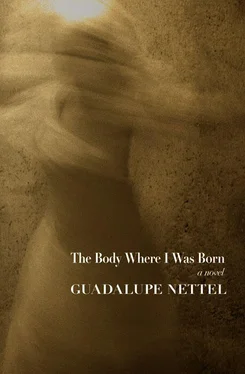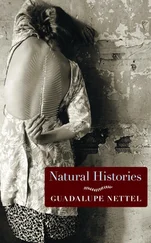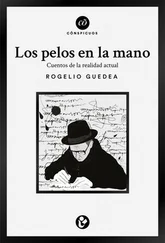My mother came back that summer. We didn’t have a lot of time to take in the news. I remember that her presence surprised me, not knowing when I had stopped believing in her return. Both of us had changed in those ten months. She seemed more loose, undone, as if the time spent without her children had noticeably softened her, while time had done the opposite to me. It wasn’t just the tense look on my face. My body, too, betrayed several transformations. I had these budding breasts my mother would look at from the corner of her eye, now and again, without saying anything. She didn’t like that I curved my back to hide them, but she didn’t dare bring it up. Had her long absence taken away her right to criticize me? Maybe, I thought naively, the French had made her more tolerant. Who knows. She didn’t breathe a word when my grandmother went off on her long list of complaints about me. It was impossible to know whose side my mother was on. Maybe she refused to align herself with either one of us, something that both my grandmother and I considered an act of disloyalty.
During her first year in France, while living in the university town of Gazelles, Mom had met a guy whom she’d refer to now and then as “my African boyfriend.” She talked about him like you would talk about a distant cousin who might very well show up at the house, but there was no way to know for sure. We knew his name was Sunil and, even though he was born and had lived almost his entire life on the island of Mauritius, his family and culture came from India. She also let us know that he was very young, twelve years younger than she was. To put it another way, his age was exactly halfway between hers and mine. Even though Mom never said anything about it, my brother and I didn’t rule out the possibility that Sunil would move in with us when we got to France.
My dad also showed up out of nowhere, but just for an afternoon. He brought with him a bag of American toys and, after showing them to us, took us to a park. There he explained why he had spent so much time in the United States: he couldn’t stay in Mexico because he was on the run from the police. Nor could he come around the apartment or be with us for very long. They had been tapping the house phone for months. He traveled incognito, under only his first and middle names. He didn’t know when the situation would get resolved, or if it would. Despite what you may think, all this information didn’t alarm me or make me anxious. It dispelled some of the uncertainty my brother and I had been living with. While many mysteries remained, truth at last came into the home through the windows like a warm and beneficent light, dissolving with its timid glimmer the dampness and filth of doubt.
In October 1984, my mother, brother and I went to live in the south of France. We spent five years in Aix-en-Provence, a city with Roman ruins that saw its apogee in the fifteenth century with the court of King René. Aix is full of remnants of remote splendor. The city is known as one of the most bourgeois and snobby in the country. However, a few miles from its center, there also exist one or two neighborhoods with high crime rates, and it was there we found a house.
Even though I don’t remember our good-byes or the flight, the evening we arrived in Aix is still present in my mind. After landing in the Marseille airport, we took a bus that brought us to our new city. That night we slept in a hotel room in the oldest neighborhood downtown. I had just turned eleven and it was the first time I’d been to Europe. Everything around me seemed unusually old, deteriorated, and different. The high windows in our room, the iron heater, the divided bathroom, the chain for flushing the toilet (a real chain with links, and no handle or button next to the water tank to push), the furniture, the pillows (one long one in the shape of a hotdog and other square ones) — everything, in short, was surprising to me. I asked my mother if our school would also be like this, but she didn’t know what I was talking about.
“As weird as this,” I insisted.
As she had already been to our future school to register us and had toured the facility, she could have given me a better answer. But, while I was trying to find out any new piece of information — anything at all about this unknown country — the poor woman was floundering in an ocean of things that needed to be figured out, some as imminent as dinner that night. Though we already had a school, we were still without a house. Until then, my mother had lived at the university and now needed to apply for housing for married students. It was the middle of October and starting to get cold, or at least it seemed so that evening. Mom left us alone in the room for a few minutes and went to get us something to eat. Dinner was what she found in the only store still open at that hour: plain yogurt in a glass container and a few slices of the thickest and most delicious ham I had ever tasted in my life. I guess there must have been bread as well. I don’t remember, but I’ll never forget the exquisite taste of the croissant I ate the next morning.
It wasn’t easy persuading the secretary at the CROUS housing office to grant us one of the residences reserved for married couples. But my mother was never unpersuasive. Through the half-open door to the office, I listened to her arguing with the woman for fifteen minutes until she had her convinced that two children count at least as much as a husband. So we left with the keys to our new home in hand and an address we were going to right away to drop off all our bags. What the secretary did not explain to us was that the building would smell like insecticide and that the area where we were about to live had the highest crime rate in the city.
Built on the outskirts of Aix, our neighborhood was called Les Hippocampes and was considered the most troubled niche of the urban development zone (the ZAC). It was a new quarter that assembled a unit of buildings around a parking lot in which, every week, its residents set stolen cars on fire in the night. Our apartment was bright, had a nice view, and could even be said to have had a certain charm. Most of our neighbors were of Maghreb origins, but there were also French, Black Africans, Portuguese, Asians, and Roma who’d settled down. As much as we investigated, we were unable to find a single Latino. Rough sights have stayed with me from those days, like the afternoon I ran into a badly beaten young wife. She was on the stairs that went up to the second floor, where you could almost always pick up on a strong smell of cumin emanating from the apartments. Seeing the woman there, hurt, in a place I had always thought of as a refuge, an intimate place par excellence, completely horrified me and I couldn’t help but wonder what secrets she must have been keeping for someone to want to reprimand her in this way. It goes without saying that it was henceforth impossible for me to make these stairs the perfect hideout for exploring my body.
Despite what you might think, the development zone our neighborhood belonged to wasn’t ugly, not the least bit. It was, in fact, full of gardens and green areas, places for kids to play, and even an architectural research center created by the father of Op Art, Victor Vasarely, and where an important part of his work is still housed. While walking through the neighborhood with my family, people would often look at us suspiciously because of our excessively occidental looks; my brother’s blond hair and my mother’s light eyes confused them. But when they heard that our language was different, and particularly when we said we were from Mexico, they automatically opened up to us the doors of their sympathy.
The school we enrolled in was not in the same neighborhood, but a little closer to downtown. It was the most progressive public school in all of Aix and the surrounding area — a Freinet method institution that boasted prestige and high standards. It was called La Maréchale, and to get there from our house all it took was to get on a bus that stopped in front of our building and to step off at the entrance to the school. Classes had begun several weeks before our arrival and that put me at a huge disadvantage: the pairs of girls that form at the start of school were already established. The teacher decided to sit me next to a pretty girl with chestnut hair. Her name was Julie. Her father was Spanish and they imagined we would understand each other. A few minutes was enough to see that Julie knew perhaps ten words of her paternal language — which wasn’t Castilian but Catalan — and that we were not going to be close, which I attribute not to a difference of nationality, so much, as to one of self-perception: she was a fairytale princess, I was Gregor Samsa. By the way, Doctor, the other day I was walking by a school and saw a mother yelling at her son like a drill sergeant. The boy, around three years old, seemed squashed by the shouts of that out-of-control woman. To defend himself, he was sinking his head down and raising his shoulders like someone expecting the roof to fall. I felt a deep sorrow; he made me think of the body and behavior of a cockroach.
Читать дальше












